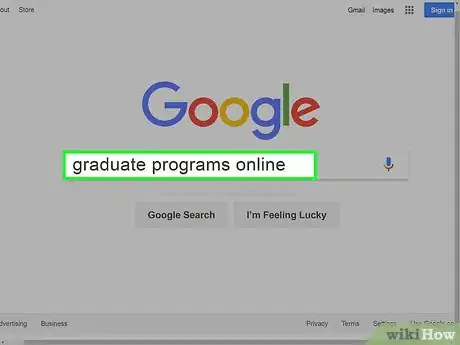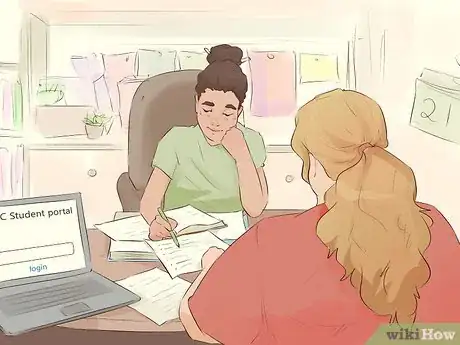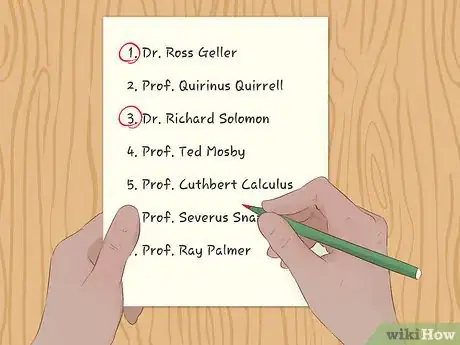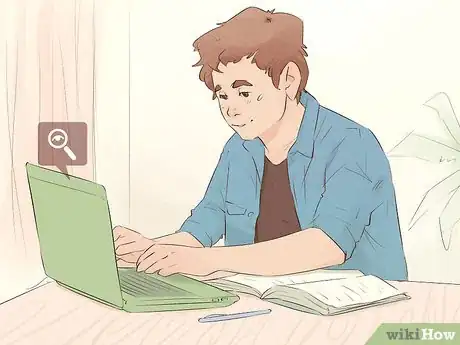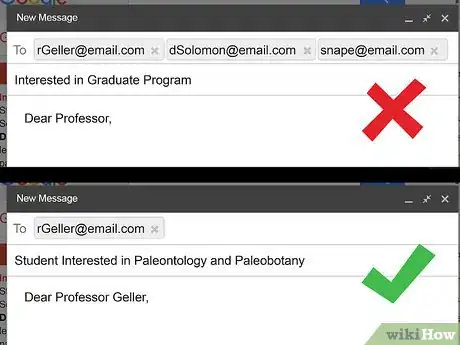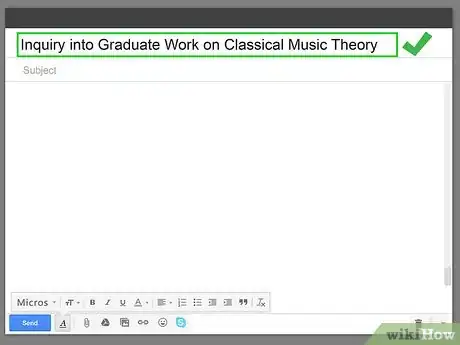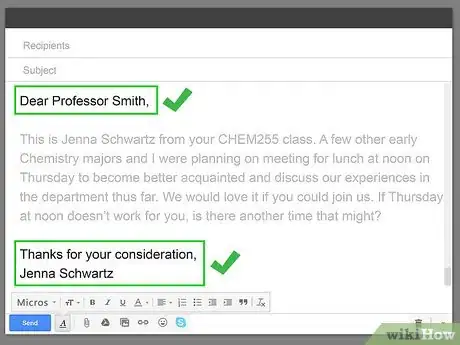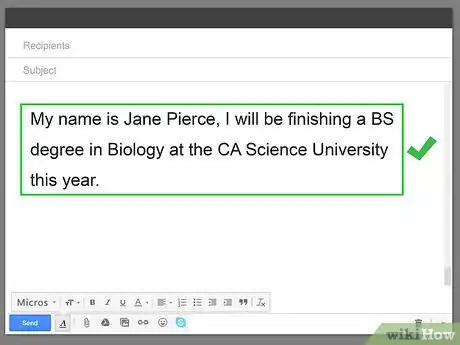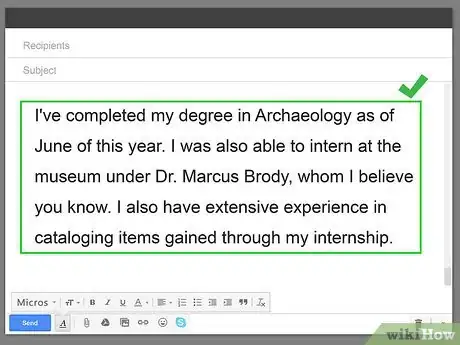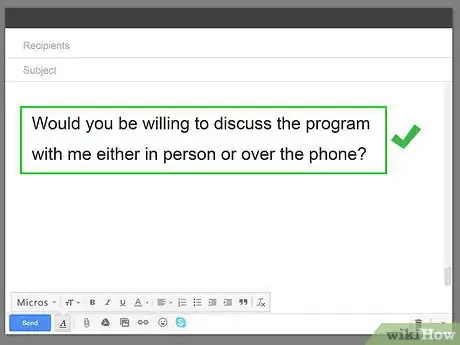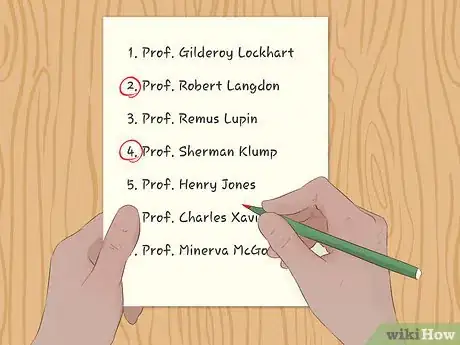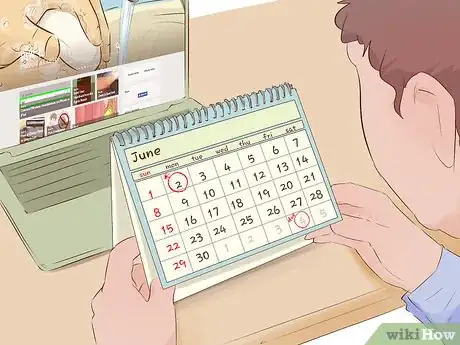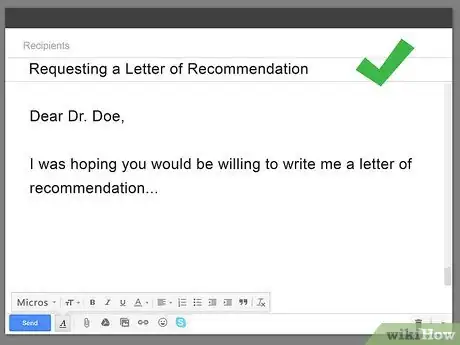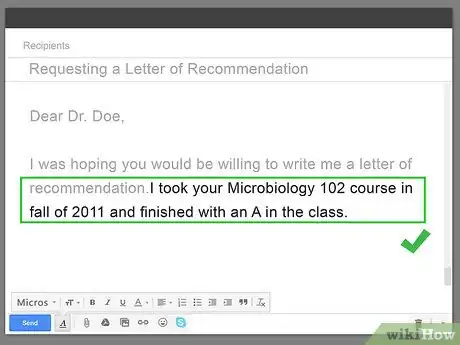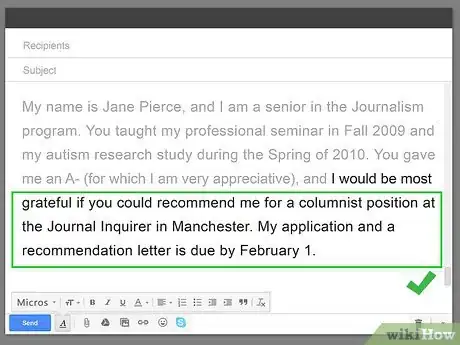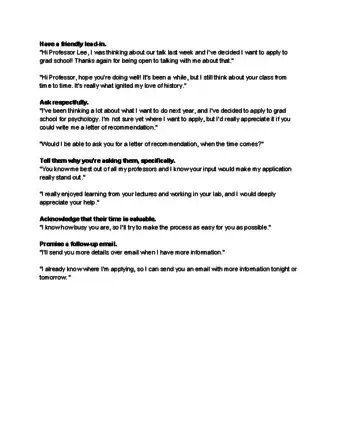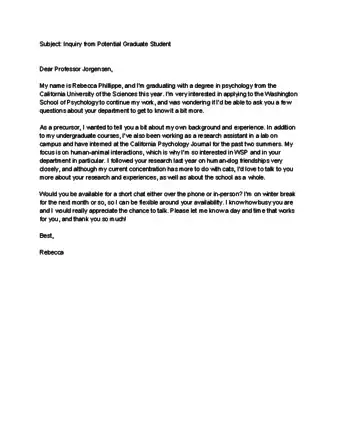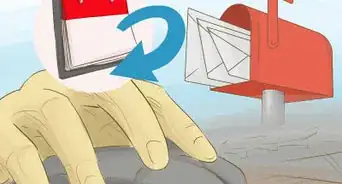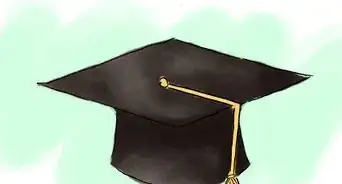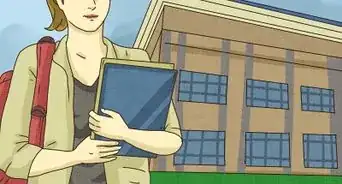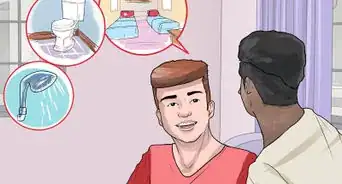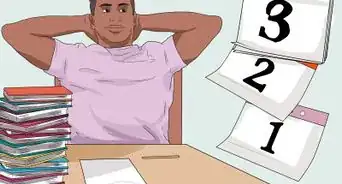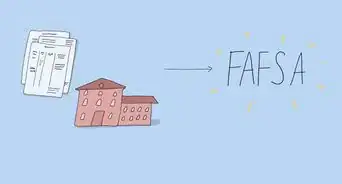This article was co-authored by wikiHow Staff. Our trained team of editors and researchers validate articles for accuracy and comprehensiveness. wikiHow's Content Management Team carefully monitors the work from our editorial staff to ensure that each article is backed by trusted research and meets our high quality standards.
This article has been viewed 54,230 times.
Learn more...
When applying for grad school, it is important to contact potential professors before applying. This will help you get detailed information about the program and will help you get on the radar of professors you want to work closely with. This contact should start with a clear and concise email. This email should illustrate your sincere interest in the program, your general qualifications, and why you want to work with the professor. Contacting the professor in this manner can help you start your graduate education off in the right way.
Steps
Doing Research Before Making Contact
-
1Research graduate programs online. Assess whether a graduate program would be a good fit for you before emailing specific professors. Look up the length of the program, the cost of the program, and whether it is located somewhere that is convenient for you. Additionally, you should assess whether the program aligns with your specific academic interests and if it will help you in achieving your educational and career goals.[1]
- For example, if you want to pursue an advanced degree in Chemistry look for information about what funding is available, what type of research the department excels in, what labs you could work in, the history of funding for the labs (including what grants professors in the department have received), the department job placement history, and what the graduation requirements are.
- Thoroughly review the website of the university, graduate school, and the individual department.
-
2Contact the school to get specific questions answered. To get information not available online, you can contact the graduate school and the department graduate program coordinator. The department graduate program coordinator is usually listed on the department's website and is typically a professor in the department.
- Make sure that you are not asking these people questions that could easily be answered online.
Advertisement -
3Pick professors that match your academic interests. When applying for a graduate program, you need to identify professors that are a good fit with your interests. While their work doesn't need to match your potential work exactly, it should be generally similar.
- For example, if you want to study the history of women's healthcare in Japan in the 19th century, you should identify professors that align with some aspect of that interest. They could study the social history of Japan in the 19th century or the history of women's healthcare in another region or time period. You do not need to find a professor that specifically studies women's healthcare in Japan in the 19th century, although that would be an especially good fit.
-
4Review the professor's academic work. Before emailing a professor you should become generally familiar with their scholarly work. Do a search for them online and read or skim some of their publications before contacting them.[2]
- By becoming familiar with the professor's work, you will be better prepared to explain to them why your academic work would be a good fit with theirs.
-
5Send personalized emails to each professor. When applying for a number of graduate programs you may be tempted to send totally generic emails to several professors. Do not do this. A personalized email will be much more engaging and will show the professor that you are actually interested in working with them, as opposed to just getting in to any program.[3]
- This does not mean that some of your sentences cannot be reused. For instance, personal information about you and your academic history can be reused in multiple emails.
Writing an Introductory Email
-
1Write a clear, concise subject line. Your email should have a subject line that lets the professor know what to expect before they even open the email. Use a clear subject line, such as "Inquiry About Graduate Program" or "Questions From Potential Graduate Student."[4]
- You can also include the specific research area you want to work in in the subject line. For instance, you could write "Inquiry into Graduate Work on Classical Music Theory."
-
2Use a professional structure. It is important to be formal when emailing a professor that you want to work with. Since you haven't met yet and you are hoping for a future relationship with this person, this is your chance to make a good first impression. Remember to use complete sentences and proper grammar. Also avoid using slang or informal language.[5]
- Begin your email with a formal salutation, such as "Dear Professor Smith."
- Conclude your email with a formal closing, such as "Sincerely" followed by your full name.
-
3Begin by describing yourself and your qualifications for admission briefly. The professor doesn't need to know all of the details of your life and every one of your qualifications for acceptance into grad school in this first email. However, you should tell them enough so that they know you are a viable candidate. This information usually includes a sentence or 2 about your background and undergraduate education, including the school you went to and the year you graduated.[6]
- You may also want to include a sentence about any special programs or academic projects you have completed.
- You want to strike a balance between letting the professor know what a motivated and good student you are and giving so many details that the professor loses interest. In general, hold back the minute details of your previous academic work on the first email and include them in later correspondence.
-
4Show sincere interest in their program in the body of the email. When contacting a professor you need to tell them why you are interested in working with them and why their program is a good fit for you. If you have done your research on the graduate program in general and you have researched the professor's work, you can easily combine aspects of both of these things into a statement about why you are interested.[7]
- This is a section that you can use to give the professor a few details about your interests. Tell them what you want to study and why you became interested in that subject. You can even include the name of a previous professor that you worked with studying this subject, especially if that professor will be writing you a letter of recommendation.
-
5Ask questions at the end of the email. In order to get a reply from the professor, you should ask specific questions that you would like answered. This ensures that the professor can easily draft a response letter to you and that your email is just the beginning of correspondence with the professor.[8]
- Do not ask questions that you can find the answers to online. This will be viewed as a waste of the professor's time.
- Some questions you can ask a potential professor include "Are you accepting new graduate students at this time?" and "Would you be willing to discuss the program with me either in person or over the phone?"
Asking For Recommendations From Previous Professors
-
1Choose an appropriate professor. When applying for grad school, you will also need to contact previous professors for letters of recommendation. The best professors to ask for letters are those that you worked closely with in the past. For example, if you took several classes from the same professor or you completed an extensive research project under the supervision of a professor, this is who you should ask.
- Make sure that you choose a professor that you had individual and positive interactions with, even if you only took 1 class with them.
-
2Email the professor 5 to 6 weeks before the letter is due. When asking a professor to write a letter of recommendation you need to give them a lot of time to complete it. Not only does giving them over a month ensure that they do have time to complete it, it also shows them that you are serious and organized about your desire to go to graduate school.[9]
-
3Use a formal and professional tone. Even if you have had a close relationship with one of your professors, it is a good idea to make your email formal when asking them for a recommendation. Place "Dear Professor" and their last name at the beginning of the email.
- Using a formal tone will show the professor that you are serious about your desire to enter graduate school. This in turn will encourage them to write you a more persuasive letter of recommendation.
- The subject line should be clear and concise. For example, it could say "Requesting a Letter of Recommendation".
-
4Begin by reminding the professor of who you are. Professors tend to interact with a lot of students over the course of their careers. Because of this, it's a good idea to give them a few clues about who you are at the beginning of your email. This is especially important if it has been a few years since you interacted with the professor.
- For example, reference the class you took with them and what year it was. You could also reference a key paper you wrote in the class, any memorable guest speakers that came to class, or group projects that you were involved in.
-
5Make a clear and reasonable request. When asking a previous professor to write you a letter of recommendation, make the process as easy for them as possible. In addition to giving them several weeks to complete the letter, offer to give them a draft of your letter of intent, so they know what you are emphasizing about yourself. Also be clear about the deadline and include the links for submission in your email so that the professor can easily access them. Overall, the easier you make it for them, the more likely they are to be willing to write you a great letter.[10]
- If a professor has agreed to write you a letter, you should check in with them again a few days before it is due to ensure that it has been written and submitted. Professors tend to be very busy, so these things can slip through the cracks. Remember that it is your job to help remind them about the due date.
Help Reaching Out to Professors
References
- ↑ https://www.thoughtco.com/emailing-professors-at-potential-grad-schools-1686379
- ↑ https://www.usnews.com/education/blogs/graduate-school-road-map/2012/09/28/how-to-contact-professors-as-a-grad-school-applicant
- ↑ https://segmentify.com/blog/5-undeniable-benefits-personalized-emails/
- ↑ https://theprofessorisin.com/2011/07/25/how-to-write-an-email-to-a-potential-ph-d-advisor/
- ↑ https://www.wallstreetenglish.com/blog/how-to-write-formal-emails-in-english
- ↑ https://theprofessorisin.com/2011/07/25/how-to-write-an-email-to-a-potential-ph-d-advisor/
- ↑ https://theprofessorisin.com/2011/07/25/how-to-write-an-email-to-a-potential-ph-d-advisor/
- ↑ https://theprofessorisin.com/2011/07/25/how-to-write-an-email-to-a-potential-ph-d-advisor/
- ↑ https://wp.stolaf.edu/english/how-to-ask-a-professor-for-a-letter-of-recommendation/
